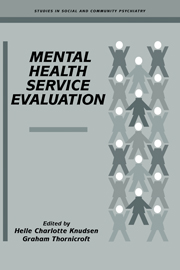Book contents
Foreword
Published online by Cambridge University Press: 05 August 2016
Summary
The veracity of the statement that mental illnesses are frequent and can have severe consequences has now been accepted in most developed and many developing countries. The notion that mental health services can offer the mentally ill more than asylum and protection is also becoming accepted; but just how much health services can do, at what cost and how remains a matter of debate and uncertainty because information about the issue is insufficient in quality and quantity. In part, this is due to the methodological difficulties arising in any attempt to measure changes in human behaviour, quality of life and levels of functioning in social roles. In part, the lack of data is due to a reluctance to carry out detailed (and often tedious) measurements and to provide sufficient resources to make assessment in a scientifically and ethically acceptable manner. It is still rare to find that research on service evaluation receives as much recognition in academic circles and among decision-makers as its complexity and importance deserve. In part, data are difficult to obtain because those who operate services fear that the data will be used to reduce budgets, personnel or both, or to induce changes in the operation of services. In part also, there is insufficient awareness about the existence of methods that can be used in the evaluation of services and about the advantages that those who are involved in providing them can have if valid and relevant data are made available without delay.
The authors and editors of this book have every reason to be proud of its appearance. They have brought together many of the elements which have to be available if evaluation of mental health services is to happen and be useful to all concerned. The book contains lucid reviews of epidemiological issues arising in evaluation programmes, clear and straightforward descriptions of methods which can be used to evaluate programmes and health service systems, and fine examples which illustrate the issues raised.
It is my sincere hope that this volume will serve not only as a repository of knowledge but also as a tool box which its authors and readers will use in making evaluation an integral part of practice.
- Type
- Chapter
- Information
- Mental Health Service Evaluation , pp. xv - xviPublisher: Cambridge University PressPrint publication year: 1996



